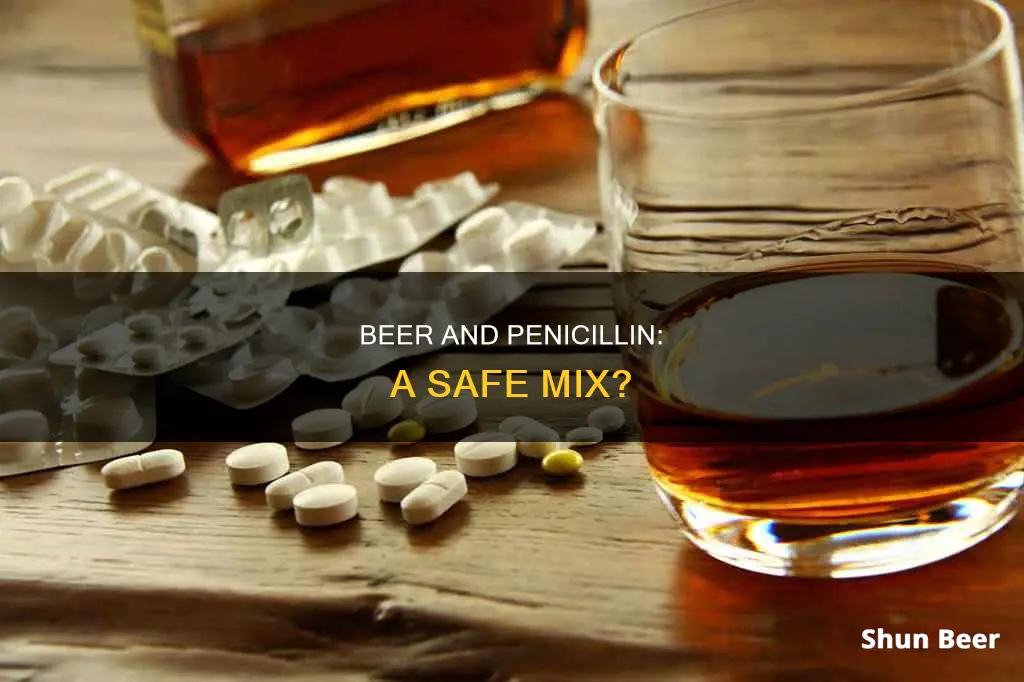
It is generally advised to avoid drinking alcohol when taking medication or feeling unwell. While alcohol doesn't interact with penicillin, it may intensify side effects such as nausea and dizziness. It is important to refer to the patient information leaflet inside the medication package to check for any warnings or side effects. While it is unlikely that drinking alcohol in moderation will cause problems when taking most common antibiotics, certain antibiotics, such as metronidazole and tinidazole, may cause a serious reaction when combined with alcohol.
| Characteristics | Values |
|---|---|
| Alcohol's effect on penicillin's effectiveness | Alcohol does not affect penicillin's effectiveness |
| Alcohol's effect on side effects | Alcohol may worsen side effects such as nausea and dizziness |
| Recommended alcohol intake while taking penicillin | It is generally advised to avoid alcohol when taking medication or feeling unwell |
| Exceptions | There are no known exceptions |
What You'll Learn

The side effects of mixing alcohol and antibiotics
Mixing alcohol and antibiotics can have several side effects, and it is generally advised to avoid drinking while on medication. Alcohol can cause a serious reaction when combined with certain antibiotics, and it is important to heed the warnings on medication packaging and information leaflets. While alcohol may not stop most antibiotics from working properly or directly reduce their effectiveness, it can cause a range of negative side effects and hinder the body's ability to recover from an infection.
Drinking alcohol while taking antibiotics can lead to digestive problems, such as stomach pain, diarrhoea, and ulcers. It can also cause flushing, which is the reddening and warming of the skin. Additionally, alcohol can increase the risk of experiencing certain side effects of antibiotics, such as nausea, dizziness, drowsiness, and headaches. Both alcohol and antibiotics can also hinder cognitive function, concentration, and coordination.
Some specific antibiotics, such as metronidazole, tinidazole, and linezolid, are known to have more severe interactions with alcohol. Consuming alcohol while taking these antibiotics can result in severe fatigue, chest pain, heart palpitations, breathlessness, vomiting, and severe digestive issues. Mixing alcohol with certain antibiotics, including linezolid, can also damage vital organs, including the liver.
Furthermore, alcohol can interfere with essential processes that are critical for recovery from a bacterial illness, such as sleep and hydration. It can disrupt sleep patterns and cause dehydration, which can prolong the recovery process and increase the risk of developing another infection. Therefore, it is generally recommended to avoid alcohol until the course of antibiotics is completed and the body has received adequate rest and nutrition.
Understanding Inline Beer Filters: Mechanism and Functionality
You may want to see also

The dangers of mixing alcohol and antibiotics
Mixing alcohol and antibiotics is generally not recommended due to the potential risks and negative side effects. While alcohol may not always affect the effectiveness of antibiotics, it can cause harmful interactions and impact the body's ability to recover from an infection.
Firstly, it is important to note that alcohol can directly inhibit the effectiveness of certain antibiotics, such as doxycycline and erythromycin, leading to reduced treatment outcomes. Additionally, alcohol can increase the risk of experiencing negative side effects associated with antibiotics, such as nausea, vomiting, dizziness, drowsiness, and headaches. These side effects can be amplified when combined with alcohol, and in some cases, alcohol can even cause violent physical reactions when mixed with specific antibiotics.
Secondly, alcohol consumption can negatively impact the body's ability to recover from an infection. Drinking alcohol can disrupt sleep patterns and hydration levels, which are critical components of the healing process. It can also interfere with the absorption of vital nutrients, increase blood sugar levels, and zap energy levels, hindering the body's ability to fight off infections.
Furthermore, alcohol can have negative effects on the immune system, making individuals more susceptible to developing another infection. This is especially concerning when taking antibiotics, as the body is already working to fight off an existing infection.
It is worth noting that some antibiotics, such as metronidazole and tinidazole, are known to cause serious reactions when combined with alcohol. Symptoms of this reaction may include breathlessness, headaches, chest pain, increased or irregular heartbeat, and nausea or vomiting. Therefore, it is strongly advised to avoid alcohol consumption while taking these medications and for a specified period after completing the course.
Lastly, it is important to consider that even small amounts of alcohol can be found in unexpected places, such as mouthwash and cold medications. Therefore, individuals taking antibiotics should be cautious and carefully read the labels of all products to ensure they do not inadvertently consume alcohol.
In conclusion, while it may be tempting to enjoy an alcoholic beverage, it is best to avoid alcohol consumption altogether when taking antibiotics. This will help reduce the risk of harmful interactions and side effects, and ensure the body can effectively heal and recover from the infection. As always, it is important to follow the advice of your doctor or pharmacist regarding alcohol consumption during antibiotic treatment.
Beer and Metformin: Is One Drink Okay?
You may want to see also

The effects of alcohol on the body's ability to heal from an infection
Alcohol can have detrimental effects on the body's ability to heal from an infection. While drinking alcohol does not reduce the effectiveness of most antibiotics, including penicillin, it can still interfere with the body's ability to heal in other ways. Here are some ways in which alcohol can impact the healing process:
Disruption of Sleep Patterns
Getting sufficient rest is crucial for recovering from sickness or infection. Alcohol consumption can disrupt sleep patterns and prevent individuals from getting a good night's sleep, hindering the healing process.
Impaired Nutrient Absorption
Alcohol can interfere with the body's ability to absorb vital nutrients. It can increase blood sugar levels and deplete energy levels, both of which can negatively impact the body's ability to heal and recover from an infection.
Increased Health Risks
Chronic alcohol use is associated with a higher risk of developing various health conditions, including pneumonia, alcoholic liver disease, certain cancers, and tuberculosis. These conditions can complicate the body's ability to heal and recover from infections.
Impaired Immune System
Alcohol can weaken the immune system, making individuals more susceptible to infections. It can decrease the body's ability to ward off infections, even up to 24 hours after drinking. This increased susceptibility can delay healing and prolong the recovery process.
Disruption of Gut Microbiome
Alcohol can alter the composition of the gut microbiome, which plays a crucial role in maintaining normal gut function and supporting the immune system. This disruption can lead to a leaky gut, allowing microbes to enter the circulation and triggering inflammation and other health issues.
Impaired Wound Healing
Alcohol has been linked to a higher risk of wound infections and delayed wound closure. It impairs the function of dermal fibroblasts, which are essential for wound healing, making it more difficult for the body to recover from injuries or surgical procedures.
In conclusion, while alcohol may not directly interfere with the effectiveness of antibiotics like penicillin, it can have significant negative impacts on the body's ability to heal from an infection. It is advisable to avoid alcohol consumption, especially when taking medication or recovering from an infection, to ensure optimal healing and reduce potential health risks.
Beer and Sulfamethoxazole: Is It Safe to Drink?
You may want to see also

The NHS's advice on drinking alcohol while taking antibiotics
The NHS advises that some antibiotics can interact with other medicines or substances, and may have an effect that is different from what you expected. While it is unlikely that drinking alcohol in moderation will cause problems if you are taking most common antibiotics, it is still a good idea to avoid drinking alcohol when taking any medication or feeling unwell.
Some antibiotics, such as metronidazole and tinidazole, are known to cause a serious reaction when combined with alcohol. Symptoms of this reaction include breathlessness, headaches, chest pain, increased or irregular heartbeat, and nausea or vomiting. It is best to completely avoid alcohol while taking these antibiotics and for 48-72 hours after you stop taking them.
Drinking alcohol while taking other antibiotics, such as linezolid, doxycycline, and the contraceptive pill, may also be problematic. Linezolid can be affected by undistilled alcoholic drinks, such as wine, beer, sherry, and lager. Alcohol can also affect doxycycline and may be less effective in people with a history of drinking heavily. Some antibiotics, like rifampicin and rifabutin, can also reduce the effectiveness of the combined contraceptive pill.
It is important to always read the patient information leaflet that comes with your medication and to ask your GP or pharmacist if you are unsure whether it is safe to drink alcohol while taking antibiotics.
Carrying a Concealed Weapon and Drinking Beer in Virginia
You may want to see also

The history of the myth that antibiotics and alcohol don't mix
The idea that antibiotics and alcohol don't mix is a myth with an unclear origin. However, it is believed that the myth may have originated in the 1950s when penicillin was introduced as a treatment for sexually transmitted infections (STIs). Doctors were concerned that drinking alcohol would lead to disinhibited behaviour that could cause their expensive treatment to be undone. As a result, patients were advised to abstain from alcohol until they had recovered.
Another theory suggests that the myth may have been spread by doctors as a way to punish patients for contracting STIs by depriving them of alcohol.
While it is true that certain types of antibiotics can have unpleasant side effects when mixed with alcohol, this is not true for all antibiotics. In fact, most of the commonly prescribed antibiotics are not affected by alcohol. However, it is still generally advised to avoid excessive drinking when taking any medication, as it can interfere with your body's ability to recover from an infection.
Some of the antibiotics that should not be mixed with alcohol include metronidazole, tinidazole, and sulfamethoxazole/trimethoprim. These drugs block the pathways that metabolise alcohol, leading to a buildup of acetaldehydes, which are responsible for many of the unpleasant effects of a hangover. Mixing these antibiotics with alcohol can cause symptoms such as nausea, vomiting, facial flushing, headache, breathlessness, and chest pain.
It is important to follow the advice of your doctor or pharmacist regarding alcohol consumption while taking antibiotics. In most cases, it is recommended to avoid alcohol during and for a short period after taking antibiotics to avoid any potential side effects.
Public Drinking Laws: Beer in the Park?
You may want to see also
Frequently asked questions
While alcohol doesn't have the ability to interact with penicillin, a person should be mindful of the fact that there may be side effects as some antibiotics, such as penicillin, do have a variety of side effects, such as causing nausea and dizziness, which might be made worse by drinking alcohol.
Side effects of drinking alcohol while taking penicillin may include causing nausea and dizziness.
Drinking alcohol while taking antibiotics can increase your chance of developing side effects. The specific side effects depend on the drug. However, some common side effects of antibiotics include digestive problems such as stomach pain, diarrhea, and ulcers.
Other side effects of drinking alcohol while taking antibiotics include:
- Increased or irregular heartbeat
- Vomiting
- Hot flushes
- Headaches
- Breathlessness
- Chest pain







